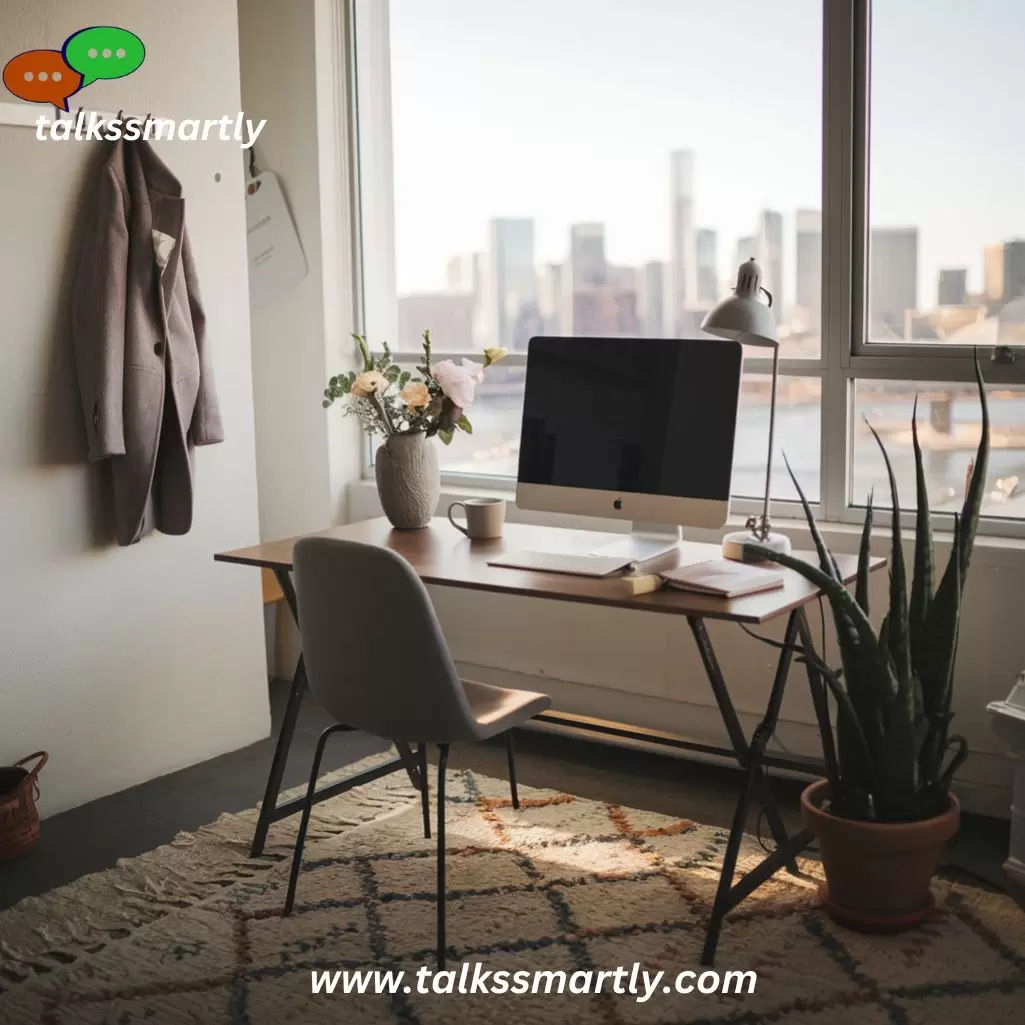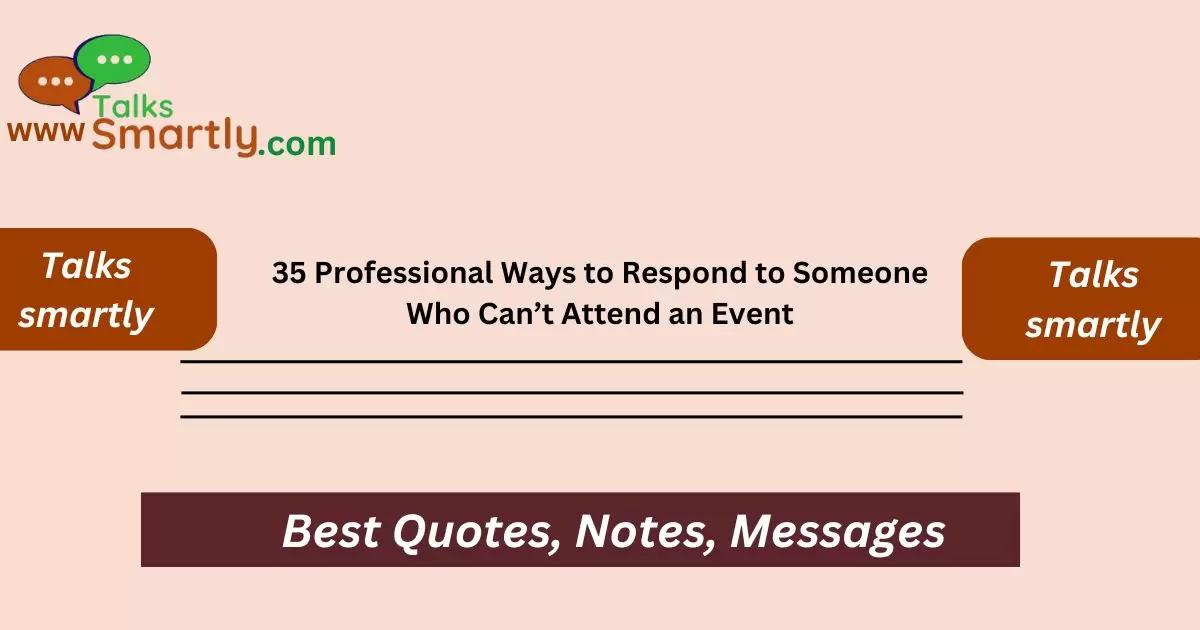“Responding professionally to someone who can’t attend an event ensures you maintain respectful, empathetic, and effective communication, regardless of the situation”
When someone informs you that they are unable to attend an event, it is important to respond with professionalism and understanding. Whether it’s a work event, social gathering, or an important meeting, your response should show empathy and maintain positive communication. In this blog post, we will discuss 35 professional ways to respond to such situations and provide practical examples to ensure you handle these moments with grace.
When organising events, meetings, or gatherings, there’s always a chance that someone may not be able to attend. As much as you’ve planned, unforeseen circumstances arise, and it’s crucial to respond with professionalism and empathy when someone informs you they won’t be present. This ensures that the lines of communication remain open and respectful.
In this post, we aim to provide 35 professional responses you can use when you find yourself in such a scenario. These phrases are adaptable to both formal and casual contexts, ensuring that your reply matches the tone of the event and the relationship you share with the person.
35 Professional Ways to Respond to Someone Who Can’t Attend an Event
- Thank you for letting me know in advance.
- We will miss your presence at the event.
- I understand, and I hope everything is okay.
- Your participation would have been valuable, but I understand.
- Let’s catch up soon to fill you in on what you missed.
- I appreciate your honesty, and I hope we’ll see you next time.
- It’s unfortunate, but I completely understand.
- We’ll make sure to update you with key takeaways from the event.
- Your absence will be felt, but we hope for another opportunity.
- Thank you for notifying me, and I hope all is well.
- I respect your decision and understand things come up.
- Don’t worry, I’ll keep you updated on everything you missed.
- We appreciate your efforts in notifying us ahead of time.
- No worries, these things happen. I hope to see you soon.
- We will surely miss having you with us, but I completely understand.
- Your contribution will be missed, but we understand.
- Thank you for the heads-up. We’ll keep you informed.
- I understand, and we’ll plan to catch up another time.
- I’m sorry to hear that, but I completely understand.
- You’ll be missed, but I hope all goes well with your other commitments.
- Thank you for letting me know. We’ll make sure you’re caught up afterward.
- It’s unfortunate, but I understand.
- I’ll make sure to share any important notes or updates.
- Thank you for notifying us early, it’s much appreciated.
- We hope you can make it to the next one!
- I’m sorry to hear you can’t make it, but I understand.
- We’ll keep you updated on what you missed.
- Thank you for the notice, and I hope to see you at future events.
- We’ll miss having you there, but I understand.
- No worries! I hope everything is okay on your end.
- Your absence will be noticed, but we’ll catch you up afterward.
- I appreciate the early notice, and we’ll follow up with updates.
- You’ll definitely be missed, but we’ll update you on the details.
- It’s a shame you can’t make it, but I understand.
- Thank you for keeping me informed. I hope we’ll catch up soon.
1. Thank you for letting me know in advance.
When someone gives you advance notice, it’s important to acknowledge their communication.
Example: “Thank you for letting me know in advance, Sam. I appreciate your consideration in informing me early.”
2. We will miss your presence at the event.
Express that their absence will be noticed and missed to make them feel valued.
Example: “We will miss your presence at the meeting, Emily. Your input is always insightful.”
3. I understand, and I hope everything is okay.
This response shows empathy and concern for their well-being.
Example: “I understand you can’t make it, Alex. I hope everything is okay on your end.”
4. Your participation would have been valuable, but I understand.
Recognize their potential contribution, but remain understanding of their situation.
Example: “Your participation would have been valuable, John, but I understand things come up.”
5. Let’s catch up soon to fill you in on what you missed.
This response keeps the communication open by suggesting a follow-up.
Example: “Let’s catch up soon, Lisa, so I can fill you in on what you missed during the event.”
6. I appreciate your honesty, and I hope we’ll see you next time.

Thank them for being upfront and express your hope for future attendance.
Example: “I appreciate your honesty, Mark. I hope we’ll see you at the next meeting.”
7. It’s unfortunate, but I completely understand.
This acknowledges their absence with empathy while being understanding.
Example: “It’s unfortunate you won’t be there, Sarah, but I completely understand.”
8. We’ll make sure to update you with key takeaways from the event.
Offer to keep them informed even though they can’t attend.
Example: “Don’t worry, Jane. We’ll make sure to update you with the key takeaways from the workshop.”
9. Your absence will be felt, but we hope for another opportunity.
Express that they will be missed and leave the door open for future opportunities.
Example: “Your absence will be felt, Tom, but I’m sure there will be another opportunity for us to meet.”
10. Thank you for notifying me, and I hope all is well.
Show gratitude for their communication and check in on their well-being.
Example: “Thank you for notifying me, Rachel. I hope everything is well on your end.”
11. I respect your decision and understand things come up.
This demonstrates respect for their decision while acknowledging life’s unpredictability.
Example: “I respect your decision, Paul. I understand things can come up unexpectedly.”
12. Don’t worry, I’ll keep you updated on everything you missed.
Reassure them that they won’t be left out of important updates.
Example: “Don’t worry, Sam. I’ll keep you updated on everything you missed at the conference.”
13. We appreciate your efforts in notifying us ahead of time.
Express gratitude for their proactive communication.
Example: “We appreciate your effort in notifying us ahead of time, Maria. Thank you for being considerate.”
14. No worries, these things happen. I hope to see you soon.
This response keeps the tone light while expressing understanding.
Example: “No worries, Tim. These things happen, and I hope to see you soon.”
15. We will surely miss having you with us, but I completely understand.
Recognize their absence while showing empathy for their situation.
Example: “We will surely miss having you with us, David, but I completely understand.”
Creative Alternatives to “Eat Your Dinner”
16. Your contribution will be missed, but we understand.
Acknowledge that their input is valued, but show understanding.
Example: “Your contribution will be missed, Susan, but we understand that things come up.”
17. Thank you for the heads-up. We’ll keep you informed.
Appreciate their communication and ensure they will be kept in the loop.
Example: “Thank you for the heads-up, James. We’ll keep you informed of any important updates.”
18. I understand, and we’ll plan to catch up another time.
Suggest a future opportunity to catch up and stay connected.
Example: “I understand, Karen. We’ll plan to catch up another time after the event.”
19. I’m sorry to hear that, but I completely understand.
Express mild regret but remain understanding of their situation.
Example: “I’m sorry to hear that you won’t be joining us, Tom, but I completely understand.”
20. You’ll be missed, but I hope all goes well with your other commitments.
Acknowledge their other obligations while letting them know they’ll be missed.
Example: “You’ll be missed, Anna, but I hope all goes well with your other commitments.”
21. Thank you for letting me know. We’ll make sure you’re caught up afterward.
Show gratitude and offer to share the key points with them later.
Example: “Thank you for letting me know, Matt. We’ll make sure to catch you up afterward.”
22. It’s unfortunate, but I understand.
A simple, direct response that acknowledges the situation without pushing for more.
Example: “It’s unfortunate that you can’t make it, Julie, but I understand.”
23. I’ll make sure to share any important notes or updates.
Offer to keep them in the loop by sharing key details later.
Example: “Don’t worry, Sarah. I’ll make sure to share any important notes or updates with you.”
24. Thank you for notifying us early, it’s much appreciated.
Appreciate their early notice, which shows respect for your planning.
Example: “Thank you for notifying us early, Ben. It’s much appreciated.”
25. We hope you can make it to the next one!
End on a positive note by inviting them to future events.
Example: “We hope you can make it to the next event, Emily! It won’t be the same without you.”
26. I’m sorry to hear you can’t make it, but I understand.
Express empathy while remaining understanding of their situation.
Example: “I’m sorry to hear you can’t make it, Mark, but I completely understand.”
27. We’ll keep you updated on what you missed.
Reassure them that they won’t be out of the loop.
Example: “Don’t worry, Lisa. We’ll keep you updated on what you missed.”
28. Thank you for the notice, and I hope to see you at future events.
Express gratitude and keep the door open for future opportunities.
Example: “Thank you for the notice, Tim. I hope to see you at future events.”
29. We’ll miss having you there, but I understand.
Acknowledge their absence while respecting their situation.
Example: “We’ll miss having you there, David, but I understand.”
30. No worries! I hope everything is okay on your end.
Keep it light and empathetic while ensuring their well-being.
Example: “No worries, Sarah! I hope everything is okay on your end.”
31. Your absence will be noticed, but we’ll catch you up afterward.

Let them know their absence matters, but you’ll fill them in later.
Example: “Your absence will be noticed, Kate, but we’ll catch you up afterward.”
32. I appreciate the early notice, and we’ll follow up with updates.
Show gratitude and offer to keep them informed.
Example: “I appreciate the early notice, Jack, and we’ll follow up with updates.”
33. You’ll definitely be missed, but we’ll update you on the details.
Reassure them they won’t be left out of important information.
Example: “You’ll definitely be missed, Sophie, but we’ll update you on the details.”
34. It’s a shame you can’t make it, but I understand.
This response balances disappointment and empathy.
Example: “It’s a shame you can’t make it, Mike, but I understand.”
35. Thank you for keeping me informed. I hope we’ll catch up soon.
Express gratitude for their communication and suggest a future catch-up.
Example: “Thank you for keeping me informed, Sarah. I hope we’ll catch up soon.”
ANSWER TO KEY QUESTION
1. Why is it important to respond professionally when someone can’t attend an event?
Maintaining professionalism shows respect and understanding, which fosters positive relationships and keeps communication channels open.
2. Can I use these responses for both formal and informal events?
Yes, these responses are versatile and can be tailored to fit both formal and casual settings.
3. What should I do if the person gives a last-minute cancellation?
In such cases, still respond with understanding and professionalism. You can express disappointment but acknowledge their situation.
4. How can I ensure the person stays updated on what they missed?
Offer to share notes, summaries, or key takeaways after the event to keep them informed and included.
5. How can I be empathetic without sounding too formal?
You can keep the tone friendly while still being professional by using phrases like “I hope everything is okay” or “We’ll catch up soon.”
Conclusion
When someone informs you that they cannot attend an event, how you respond plays a crucial role in maintaining positive communication and ensuring the relationship remains strong.
By using these 35 professional responses, you’ll be able to navigate these conversations with empathy and respect, leaving the door open for future collaboration and ensuring that your tone remains professional.

Hi, I’m Lauren Reynolds, owner of Talks Smartly.
We specialize in wishes, thank you messages, and thoughtful responses for all occasions.
Whether it’s a birthday wish or a heartfelt thank you, we’re here to make your messages shine.
Join us at Talks Smartly and let your words leave a lasting impression.”











